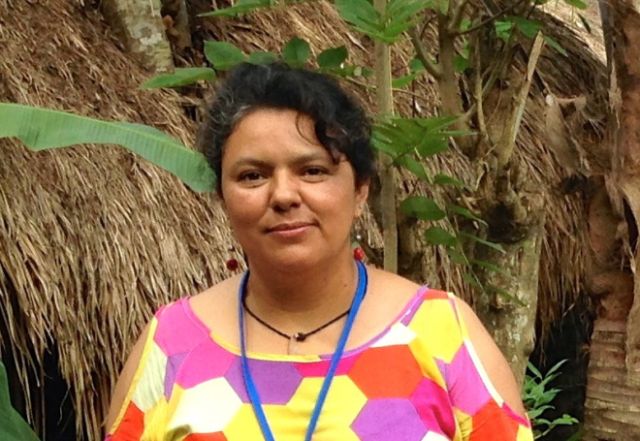
The killing of Honduran environmental activist Berta Caceres on March 3 last year closely resembles a planned extrajudicial killing by Honduran military forces with links to US-trained special forces, according to newly leaked court documents.
Caceres was a co-founder and coordinator of the Council of Popular and Indigenous Organisations of Honduras (COPINH).
An investigation into Caceres’ murder launched by The Guardian looked at court documents of the eight men arrested in connection with the murder. Three had served in the military, and one was a key figure in the hydroelectric dam against which Caceres helped to lead a struggle by indigenous people.
The new allegations centre around Major Mariano Diaz, a former chief of army intelligence. According to the leak, Diaz was in close contact with another suspect, Lieutenant Douglas Giovanny Bustillo. Both served together and received US training.
Sergio Rodriguez, a manager at the DESA-Agua Zarca hydroelectric dam — the project which Caceres focused her struggle against — was also named as a suspect. The company behind the project, DESA, also previously employed Bustillo as its head of security. Others from the company have state and military connections.
Despite a lack of consent from the local indigenous Lenca community, licenses for the Agua Zarca Dam and another dam were granted in 2010. Caceres received many death threats over her activism against the dam. At the time she was shot dead in her home, Caceres was supposedly receiving state protection.
Caceres’s family claim that DESA, in connection with the Honduran government, hired contract killers to murder Caceres and other environmental and indigenous activists.
State authorities and the military have continually denied involvement in the murder, as well as allegations of the wider use of death squads to target activists. But a source from The Guardian investigation said the murder “has all the characteristics of a well-planned operation designed by military intelligence, where it is absolutely normal to contract civilians as assassins”.
“It’s inconceivable that someone with her high profile, whose campaign had made her a problem for the state, could be murdered without at least implicit authorization of military high command,” the source said.
Amnesty International has also criticised the Honduran state for a “scandalous lack of an effective investigation” into Carceres’ murder. It also noted a failure to protect human rights and environmental activists within the country.
According to a January report by human and environmental rights group Global Witness, Honduras is the deadliest country in the world for environmental activists. More than 120 activists have been murdered since the 2009 US-backed military coup that ousted left-leaning president Manuel Zelaya.
Days before the anniversary of Caceres’s assassination, hundreds of indigenous and Black activists in Honduras gathered to strengthen their struggles to protect their land.
The February 28 forum united six indigenous communities to discuss the issue of prior, free and informed consent for companies operating on their lands, as guaranteed under international law. The gathering also paid homage to Caceres under the slogan: “Berta Lives, COPINH Continues”.
Tomas Gomez, a COPINH organiser, was optimistic about the fight ahead and the legacy that Caceres passed down to those present at the conference.
“Berta taught us to fight, to have common sense,” he said. “Berta never broke down, nor let herself be defeated. We won’t be broken, either.”
[Compiled from TeleSUR English.]